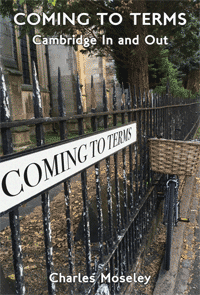Extract from Coming to Terms
 1. An undergraduate prank, of some finesse. Two young council workmen, way back in the 60s, were digging up a patch of King’s Parade, just where it was causing maximum inconvenience to a road then still open to through traffic. Two undergraduates, noticing the possibilities for confusion, slipped round the corner to the Market Square, and there found the customary policeman, with a colleague, neither unhappy yet with his lot, watching the world engaged in its employment. With expressions of acute public concern, the first undergraduate said, ‘We don’t like to split on our friends, but we think we ought to tell you that two of them are dressed up as council workmen and are digging up KP for a bet and causing a terrible fuss’. ‘Thank you very much sir, we’ll look into it.’ Whereupon the two undergraduates retreat through St Edward’s Passage, back to KP, where they go to the workmen, and say, ‘We don’t like to split on our friends, but two of them dressed up as policemen are going to try to arrest you for causing a disturbance’… Then a judicious withdrawal to The Copper Kettle café, the windows of which conveniently overlooked the scene of the ensuing contretemps…
1. An undergraduate prank, of some finesse. Two young council workmen, way back in the 60s, were digging up a patch of King’s Parade, just where it was causing maximum inconvenience to a road then still open to through traffic. Two undergraduates, noticing the possibilities for confusion, slipped round the corner to the Market Square, and there found the customary policeman, with a colleague, neither unhappy yet with his lot, watching the world engaged in its employment. With expressions of acute public concern, the first undergraduate said, ‘We don’t like to split on our friends, but we think we ought to tell you that two of them are dressed up as council workmen and are digging up KP for a bet and causing a terrible fuss’. ‘Thank you very much sir, we’ll look into it.’ Whereupon the two undergraduates retreat through St Edward’s Passage, back to KP, where they go to the workmen, and say, ‘We don’t like to split on our friends, but two of them dressed up as policemen are going to try to arrest you for causing a disturbance’… Then a judicious withdrawal to The Copper Kettle café, the windows of which conveniently overlooked the scene of the ensuing contretemps…
2. And plays…
Many of us are always counselling our young charges, for their work’s sake, not to get too involved in the theatre scene, but I think we secretly envy them the heady excitement that we can remember from our own prehistory. Of course some go over the top: but ‘doing drama’ as an undergraduate has a very honourable history, and in Renaissance Cambridge undergraduates were expected to act in plays as part of their education. Milton complains about it. It gave them skill in public speaking, taught them how to use their body, to establish an ethos,and trained the memory. These skills were essential to future lawyers and preachers and diplomats, as they still are. So it is all too easy to be indulgent when that essay is late again – ‘honest, this only goes on till Week 6 and then I’ll catch up ‘– even though one may end up giving extra help and time. Well, people were generous to us in our own time.
Cambridge drama was a quite different game to what I had been used to back home in Lancashire. Its apparent professionalism frightened me off joining in, for a Church Hall performance of a revue, or a Nativity or Passion play, had been about my limit. (My school did not ‘do’ drama.) But I loved it, as a reliable member of audiences: smoking concerts, experimental drama, bits of Ionesco (for example) acted in cellars, Becket, Shakespeare – I had only ever seen one Shakespeare play acted before I came up – and all the wealth I knew I wanted. Queens’ had – has – a very good musical society, the St Margaret SocietyakaMagsoc, and an excellent dramatic tradition in the Bats, who did an open air (usually Shakespeare) performance in Cloister Court each Easter Term. The bats (pipistrelles almost exclusively) flitting about that court in the evening gave them their name. I hope they were pleased. But it chanced that the first summer performance (Richard III) I saw happened to open when no bats came out at all, on a night of torrential rain, rain so heavy that you could see the fake chainmail some of the lads were wearing getting heavier and heavier as the string from which it was knitted soaked up the water. But Trevor Bowen, playing Richard, got an easy laugh from the wet audience with his opening line, gesturing to the sky, ‘Now is the winter of our discontent / Made glorious summer by this sun of York’, turned into a question. And audiences do sit it out whatever the weather: it is still a point of honour for many. I saw quite the wettest possible (and possibly one of the worst: not even curate’s egg standard) Midsummer Night’s Dreams in St John’s Garden a few years back, with the plastic chair on which I sat collecting a cold pool under my bottom. Only a few gave up: if they can carry on, so can we. And the Queens’ Bats tackled Romeo and Julietwith an excellent Romeo in Tim Cribb, who went on to be greatly influential on the next generations of young folk, and Waris Habibullah as a picture of malevolence in Tybalt. Cambridge is so lucky: to sample even a tiny proportion of what is on offer, theatrically or musically, is all anyone can manage. More often than not there is real talent about, people whom years later you will see at the top of their professions and in all sorts of interesting places. I wake up each morning to a very well remembered voice on the radio: its owner’s musical talent was the equal of her double First. For a middling sort of chap like me, it is still a wondrous thing to teach here, to have pupils of whom some are palpably brighter than I am, who can turn in an elegant essay, play the violin (say) to professional standard, and act, row, or play hockey or rugby in their spare time. And be fun.
It’s often these things, these odd, quirky memories, that you carry away with you when the details are forgotten, reminders of a time when all seemed possible and the world was young. And it is good to hear their voices again, on the radio, in the theatre, in politics, on film – sometimes less good to realise when reading a leader column or an article in one of the better papers that the clarity of their thought is still at roughly the stage it was when it annoyed you, and that their prose has not noticeably improved. But hardly ever do we see the end of the stories in the beginning of which we may play some small part.
Deans, being the representatives by their office of order and discipline, came in for a good deal of ragging. One who later himself became a dean told me of his revenge for a half term’s gating. A country boy, Michael knew all about bird scarers, and how to get them. Once upon a time, these consisted of a string of bangers – fireworks – connected by a long slow burning fuse. Michael was an agile fellow then, and it was an easy climb one night to get onto the roof and let a very long bird-scarer down the Dean’s chimney, from which smoke from the coal fire (still then permitted) was rising. The result was most satisfactory, for good birdscarers last for many hours, and the source of the periodic explosions was not an obvious one to trace.
On the Backs, white fluff off the poplars drifting on the wind, and forming white banks, like hot snow, between the trees’ boles and in the gutters.
One keeps tripping over various lovers – earlier selves, perhaps. Walking through Clare gateway, my eyes dazzled by the light against which I look, I see two shapes, hand in hand. As they pass, laughing, oblivious, into the sunlight of Front Court, they stop. And face each other. He says: ‘I can’t stop looking at you.’ No more. I have letters to deliver, and promises to keep.

